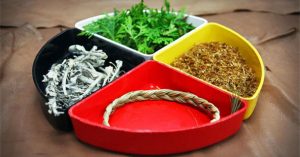Inviting Indigenous Knowledge Holders to the classroomPlease follow the Indigenous Traditional Knowledge Holder and Miigwewin Gifting process if you are interested in developing Fleming College’s relationship with Indigenous communities. |
|
Request an Indigenous Traditional Knowledge Holder to share knowledge, perspective and experience in your classroom or at an event.The Indigenous Student Services team will work with you to invite guests and help you understand the proper and respectful protocol for inviting our Indigenous partners to a classroom or event. Traditions may vary between partners and communities; therefore, it is important to follow this Indigenous Traditional Knowledge Holder Request and Miigwewin Gifting process. To invite a Traditional Indigenous Knowledge Holder to share their traditional knowledge in a classroom, a student circle, or event, please contact Liz Stone, Indigenous Knowledge Leader for information on invitation protocol and gifting requirements. Miigwewin Gifting ProcessTraditional Knowledge Holders are not to be paid for their work but rather gifted as a reciprocal gesture of appreciation. Fleming College’s process of gifting Traditional Knowledge Holders align with the traditional practice of gifting and will assist in the maintenance and expansion of Fleming College’s relationships with Indigenous communities and Indigenous Traditional Knowledge Holders. This process is known as “Miigwewin”, which translates to “the art of giving” To requisition a Miigwewin monetary gift for Indigenous persons for sharing their traditional knowledge, please contact Liz Stone, Indigenous Knowledge Leader for protocols and necessary form. |
|
List of Traditional Knowledge ResourcesFor contact information of the organizations, services, or Traditional Indigenous Knowledge Holders, or to request that additional resources be added to our list, please contact Liz Stone, Indigenous Knowledge Leader. |
|
Internal Indigenous Knowledge HoldersInternal Indigenous Knowledge Holders are those individuals that are Academic staff of Fleming College, which carry lived experiences, teachings and professional Indigenous experience in various disciplines and sectors. Internal Indigenous Knowledge Holders have been hired in part for their ability to enrich the academic experience of all students. As such, a request may be made to individual internal IKH to attend lectures, seminars, Program & School events, meetings or Fleming wide initiatives and events. To ensure that the internal Indigenous Knowledge Holder’s time and knowledge is respected, the request will be reported and approved by the internal IKH’s supervisor. At the time of the approval, the internal Indigenous Knowledge Holder’s Standard Workload Form or exception report will be will be adjusted/completed accordingly (Academic Process). Ineligible internal Indigenous Knowledge Holder requests;
Although Fleming College is fortunate to have access to Internal Indigenous Knowledge Holders, it is expected that every effort will be made to build and maintain respectful and reciprocal relationships with Indigenous Community and external Indigenous Knowledge Holders when possible. This will ensure and encourage diverse and continued learning throughout the Fleming College community. Beedahbin Peltier, Professor Indigenous Perspectives, Anishnaabe nini, Wikwemikong First Nation, School of General Arts & Sciences. Areas of Focus: Environmental Sciences, Anishnaabe history, culture & teachings, Firekeeping, Community Organizing, Professional Development. Cristine Rego, MSW, RSW, Professor Social Service Worker, Anishnaabe kwe, Lac Seul First Nation, School of Justice & Community Development. Areas of Focus: Social Work, Crisis Intervention, Health, Traditional Healing, Intergenerational Trauma, Cultural Safety, Lateral Violence in the Workplace, social justice, Power, privilege and oppression, Community engagement. Cherylanne James, Professor Indigenous Perspectives, Anishnaabe kwe, Chippewas of Rama First Nation (Mnjikaning), School of General Arts & Sciences. Areas of Focus: Child & Youth Care, Social Work, Child Welfare, Indigenous Governance, Legislation, International Human 7 Child’s Rights, Indigenous & non-Indigenous Relationship Development, Cultural Responsive Pedagogy. Elizabeth Stone, Indigenous Knowledge Leader, Anishnaabe Kwe, Aamjiwnaang First Nation, Senior Management Team. Areas of Focus: Mental Health & Addictions, Residential Youth Care, Child, Youth & Family Wellness, Indigenous Community (Urban & Rural), Indigenous Governance, History & Culture, Community Engagement, Traditional Roles & Responsibilities, Intergenerational Trauma, Truth & Reconciliation, Professional Development & Systemic Change, Indigenous & Customary Law/Justice, Restorative Justice, Remote & Rural Service Delivery, Culturally Responsive Pedagogy. |
|
